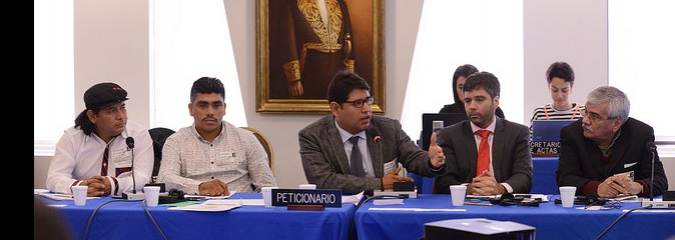
Derecho, Ambiente y Recursos Naturales (DAR), along with the Due Process of Law Foundation (DPLF), the Salvemos a Santo Domingo Movement, with the support of Centro Humboldt de Nicaragua; Acción Ciudadana y Convergencia Social and of NGOs "Tezulutlán", with the support of communities organized in resistance and defence of their water resources of Guatemala; the Fundación Justicia y Transparencia (FJT), the Observatory of Public Policies of the Universidad Autónoma de Santo Domingo, the Espacio Nacional para la Transparencia en las Industrias Extractivas (ENTRE), with the support of communities affected by the mining from the villages of La Piñita, Tocoa and the Yagal in the Sánchez Ramírez province of the Dominican Republic; Explained how access to information and environmental transparency allows the exercise of fundamental rights.
April 26, 2017. - "Nicaragua, Guatemala and the Dominican Republic are a regional example of what happens in terms of access to public information." Cesar Gamboa, Executive Director of DAR, said during the public hearing "Right of access to information and transparency in environmental management, concession, monitoring and control of extractive activities in America", carried out by the Inter-American Commission on Human Rights (IACHR).
Although these countries have legislation on access to information, it is not effective, breaching other rights, such as life, health, physical integrity, healthy environment, citizen participation, among others. The reduction of environmental regulations, criminalization of protest and corruption are the scene where the lack of transparency in the field of extractive industries in the region develops.
The audience was chaired by Esmeralda Arosemena de Troitiño and was accompanied by Commissioner James Cavallaro and the Special Rapporteur for Freedom of Speech, Edison Lanza.
Human rights, transparency and intercultural approach
Boanerges Luna from the "Salvemos Santo Domingo" Environmental Movement in Nicaragua reported that one of the mechanisms used to defend the rights of rural communities is access to public information. Such was the case of the Tajo Jabalí-Antena project, executed by the Canadian company B2GOLD, which affects the water sources of the Municipality of Santo Domingo and which process of granting and approval of the environmental impact study (EIA) was not consulted or shared with the community.
During the hearing, Luna pointed out that he has been arbitrarily detained and subjected to cruel and inhuman treatment, in reprisal of the authorities for their demands for information about the mining project:
“I have no intention to bow to the intimidation of the authorities that work with the companies that are destroying our water sources. I am aware that my testimony before this honorable Commission puts my life and integrity in danger”.
Luna explained that with the approval of the "Sovereign Security Law of the Republic of Nicaragua" in December 2015, the country institutionalized the criminalization of any act of protest, such as peaceful demonstrations, which "have been the main form of demanding rights in Nicaragua.” The rapporteur Edison Lanza said he would warn the Nicaraguan state that Luna will not suffer retaliation as a result of his participation in the hearing.
About the Nicaraguan Public Information Law, Víctor Campos, from the Centro Humboldt, reported the following:
“We work on environmental issues and are keeping track of all the times we are denied information. To this day in the last 8 or 10 years, we have not had access to public information despite having repeatedly requested it from the relevant authorities”.
The absence of transparent and participatory processes also affects the Q'eqchi people of Guatemala. Their representative, Erick Armando Cú Caal, told the members of the IACHR that no information was ever shared or consulted on the concession of the hydroelectric project on the Cahabón River - started two decades ago and that it contemplates the construction of five additional megaprojects. The project is in charge of the company Natural Resources and Cellulose (RENACE in Spanish).
The defense of water led the Q'eqchi people to request information from such structures as the Ministry of Energy and Mines and the Environment and Natural Resources, said Cú Caal. They needed to know how the natural flow of the river would be affected, but they were not informed about the construction, nor given an EIA.
“For the defense and care of the river Cahabón we have been intimidated, threatened and persecuted by workers of the company ... They have stripped us of our lands; they have virtually privatized our river”.
The Couti People, in the Dominican Republic, are also unaware of the impacts of the lack of transparency surrounding the activities of Canadian miner Barrick Gold. The contract between the state and the company has a confidentiality clause that prevents citizens from monitoring the open-pit mining project, said Trajano Potentini, President of the Fundación Justicia y Transparencia. Bienvenido Mejía, from the GEMA Foundation and the Espacio para la Transparencia de Industrias Extractivas (ENTRE), said that he does not know whether or not the "Water Discharge and Quality Law" is being complied with, and said:
“The same company has committed to bring [to the communities] two or three gallons of water daily. What does that mean? That we are losing our lives”.
¿Why does this happen?
Cesar Gamboa from DAR stated that from the analysis of the cases of Nicaragua, Guatemala and the Dominican Republic, there are two moments in which the right of access to information suffers a breach in the region: socio-environmental decision making prior to the granting of the concession, and in the development of the mining-energy project. The main victims of this omission are peasant communities, indigenous peoples, rural populations or other groups in situations of vulnerability and historical discrimination.
The most common limitations to the right of access to information are linked to the prohibition of physical or online access to the information required; The lack of training of the staff in charge; Arbitrary and inappropriate application of classification criteria (secret or confidential) and non-application of the principle of interculturality. Such a situation often leads to socio-environmental conflicts that, in the long run, " question the feasibility of investments".
Added to this are decisions taken in several countries of origin of these transnational corporations, which result is the weakening of governmental and corporate practices in the area of transparency. In this line, Daniel Cerqueira, DPLF, pointed out that:
“A few weeks ago the US Senate rescinded Section 1504 of the Dodd-Frank Act. Prior to this, extractive companies listing in the United States were required to publish information on any kind of payment to foreign governments ... It is rather strange that The United States opens a Pandora box so that the model of transparency and access to information faces setbacks also in other countries of origin of extractive companies.”
Petition to the IACHR
On behalf of the petitioners, Antonio Medina, dean of the Faculty of Law of the Universidad Autónoma de Santo Domingo and representative of the Observatory of Public Policies of the institution, requested the IACHR to demand that the states of Guatemala, Nicaragua and the Dominican Republic comply effectively with the laws of transparency, access to information, participation and consultation. It also required the development of indicators to assess the impact of extractive megaprojects on human rights, and requested that members of the IACHR visit the regions affected by the projects exposed during the hearing.
After the presentations of the petitioners, Esmeralda Arosemena de Troitiño highlighted the importance of the establishment of the Office of the Special Rapporteur on Economic, Social, Cultural and Environmental Rights (DESCA) to respond to requests made by the petitioning organizations. For his part, Commissioner James Cavallaro stressed the importance of using mechanisms for the access to information in the countries of origin of extractive companies.
The Special Rapporteur on Freedom of Speech warned about the Regional Agreement on Access to Information, Public Participation and Access to Justice in Latin America and the Caribbean (Principle 10): "From what we have seen in preliminary documents there is legislation that is going to harm civil society, they are less strict than ... those that have been set by the Court and the Inter-American Commission. The rapporteur invited civil society to take action.
“That a multilateral mechanism on access to information is approved, participation in environmental issues without any participation of the Inter-American System of Human Rights, seems grim to me. Civil society should join this claim that I am making public at this moment”.
The hearing has made evident the demand of civil society, local populations and victims of human rights violations committed in the context of extractive activities, so that the governments of the region adjust their regulations, policies and practices related to the dissemination of socio-environmental information. Only with clear information can we demand respect for fundamental rights such as health, life, water and a healthy environment.
You can see here the hearing held on March 18, in Washington DC.





